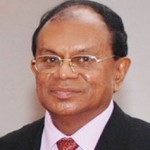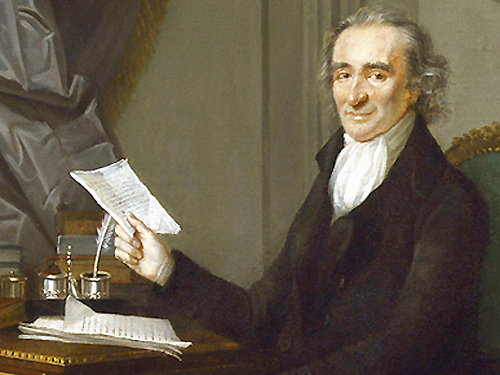First Appreciation Of Thomas Paine & His ‘Common Sense’

By Laksiri Fernando –April 6, 2017
“Government, even in its best state, is but a necessary evil; in its worst state, an intolerable one.” – Thomas Paine
There were few in history who were genuinely internationalist. Thomas Paine (1737-1809) was one whose Sri Lankan admirer, living currently in Germany, is our Amarasiri. This is written on his request in Colombo Telegraph. By saying so, I have broken the first principle of Thomas Paine who said “In the following sheets, the author hath studiously avoided everything which is personal among ourselves. Compliments as well as censure to individuals make no part thereof.” But our Sri Lankan ‘common sense’ is different. From the beginning, we gratify ourselves or friends and ‘censure’ the real or imagined enemies. We have lot of them in our baggage.
Paine was a cosmopolitan in a true sense of the word and believed in ‘multiple citizenships’ to himself. He played a major role in the American and French revolutions and tried his best to emulating them in Britain and Ireland, unfortunately without much success. In today’s parlance, he could have been branded as an international NGO dude or conspirator.
He was born in England (Norfolk) to an artisan family and his father was a tailor, making corsets to the nobility. That was also Paine’s occupation for a while. He had only a basic education, nevertheless with excellent writing skills from the beginning, and an open mind to the world of politics. Fighting for justice apparently was ingrained in his blood. When he emigrated to America in 1774, he was 37. That is where he blossomed into a radical and a popular philosopher. Otherwise he was considered a conservative. He apparently had some contacts with Benjamin Franklin by the time of his migration to America. His later acquaintance was mainly with Thomas Jefferson. What attracted him there perhaps was the simmering revolutionary firmament against the British crown. He was an outright republican.
Role in the American Revolution
Paine obtained employment as an assistant editor in the ‘Pennsylvania Magazine’ based in Philadelphia. Most of the other time, he was in Kopi-Kade (coffee-houses), associating with revolutionaries there. In January 1776, he published his ‘Common Sense’ pamphlet, the most powerful and widely read manifesto for independence from Britain. This was after the battles in Lexington and Concord in 1775 where many souls had to be sacrificed. Within a year, it sold over 150,000 copies and that is how he became a major figure in the American revolution.
There were series of writings even thereafter during the revolution. His pen became more powerful when there were set backs, than victories. All what he wrote were inspirational. When Washington’s troops had to withdraw in December 1776, facing the advancing brutal British troops, he wrote:
There were series of writings even thereafter during the revolution. His pen became more powerful when there were set backs, than victories. All what he wrote were inspirational. When Washington’s troops had to withdraw in December 1776, facing the advancing brutal British troops, he wrote:
“Tyranny, like hell, is not easily conquered, yet we have this consolation with us, that the harder the conflict, the more glorious the triumph.”
Even in supporting the revolution, he was not ready to compromise what he believed to be justice and truth. When he was serving the Continental Congress, he had some quarrels with other ‘comrades’ or colleagues on matters of principle. The dispute with Silas Deane was one. He faced other odds with many as he was a newcomer to the scene. Some wanted to keep their authority or seniority. Therefore, his association with the Continental Congress also was short lived. But finally, he was proved to be correct. Silas Deane almost became a betrayer to the revolution by 1981. Even before, Paine was vindicated and appointed to the Pennsylvania Assembly in 1779. He could be considered as a founding father of the United States. ‘The American Crisis’ was a pamphlet series that he wrote during 1776 and 1783 to earn his commitment to the revolution. In recent times both Presidents Reagan and Obama quoted him in their inaugural addresses.
His commitment to the revolution and America was unconditional. But he couldn’t become a blind patriot. Even Quincy Adams was discourteous to him on this matter. He said Paine had “no country and no affections that constitute pillars of patriotism.” What had to be admitted or admired was that Paine’s commitment was not to the country per se, but to the principles; what he believed to be justice or more correctly as ‘liberty and equality.’ Throughout Europe he stood for representative government instead of hereditary politics or monarchy.
His commitment to the revolution and America was unconditional. But he couldn’t become a blind patriot. Even Quincy Adams was discourteous to him on this matter. He said Paine had “no country and no affections that constitute pillars of patriotism.” What had to be admitted or admired was that Paine’s commitment was not to the country per se, but to the principles; what he believed to be justice or more correctly as ‘liberty and equality.’ Throughout Europe he stood for representative government instead of hereditary politics or monarchy.
Why Common Sense?
Paine was not an abstract theorist. That is why he appealed to the common sense. Liberty or equality was not abstract principles to him; they were closer to reason, nature and human sentiments. That is what he believed. However, he was a visionary. He believed and said, “We have it in our power to begin the world all over again.” Perhaps here he was little ‘utopian.’ He had to learn from bitter experiences that it is not so easy. He had his own disillusionments on these counts, especially after his role in the French revolution.
What is admirable about Paine particularly was he was a self-made man. He was wholly self-taught in political theory. He admitted that he had never read John Locke. Then what produced his political ‘philosophy’ was the circumstances and his thoughtful or often polemical reactions to them. Maybe he had a high IQ or something similar to that. Therefore, many reviewers (i.e. J. G. A. Pocock) found it difficult to fit him into any kind of category. He had benefitted immensely from coffee-house political arguments. He was reacting to them in a more thoughtful manner. It is said that he had an amazing memory. He also had a lot of travel baggage in terms of experiences and ideas. That is the best explanation that we can give for the roots of his ideas. Those were not definitely located in previous books.
He was also an innovative man, though not always practical. After the American revolution, he slowly left behind politics for a while, until he was inspired again to go to France in 1787. Not that he gave up or disillusioned about changing the world. But he wanted to experiment something else. He was involved in a series of innovations. He was experimenting a ‘smokeless candle’ and I think he succeeded. Now these are common. More importantly, he was designing a single-arched iron bridge. The rationale was that the concrete bridges stood on piers were unstable when ice floated during the spring. He designed a bridge of thirteen sections to represent thirteen states of new America. But the Pennsylvania Assembly was undecided whether to fund such a bridge, until he lost his patients and left the country. He did build such bridge in London (at Lisson Green), more as a show piece, but became dismantled after a while.


